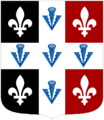John Thomas Banks facts for kids
Quick facts for kids
Sir John Thomas Banks
KCB FRCPI
|
|
|---|---|
| Born | 14 October 1816 |
| Died | 16 April 1908 (aged 91) 45 Merrion Square, Dublin
|
| Burial place | Mount Jerome cemetery, Dublin |
| Occupation | Regius Professor of Physic (professor of medicine) |
| Spouse(s) | Alicia Wright Banks |
| Children | 3 |
| Parent(s) | Percival Banks Mary Ramsay Banks |
Sir John Thomas Banks (born October 14, 1816 – died July 16, 1908) was a very important physician (doctor) who worked in Ireland. He was known for his work in medicine and for teaching at Trinity College, Dublin. From 1880 to 1898, he held a special position there called Regius Professor of Physic, which means he was a top professor of medicine.
Contents
Sir John Thomas Banks's Life
His Family and Where He Grew Up
John Thomas Banks was born in London, England. However, he spent most of his life working in Ireland. At that time, Ireland was part of the United Kingdom. People saw him as part of the Anglo-Irish class, which meant his family had English roots but lived in Ireland.
He was born right after the Great War, a big conflict that had lasted for 22 years. His father, Percival Banks, and his grandfather, also named Percival Banks, were both doctors. His father was a surgeon (a doctor who performs operations) in a town called Ennis. His mother, Mary Ramsay, came from a family of army captains.
His Education and Early Career
John Thomas Banks started studying medicine in the 1830s at the Royal College of Surgeons in Ireland. One of his teachers was a famous doctor named Sir Henry Marsh. He got his license to practice medicine in 1836.
He continued his studies at the Royal College of Physicians of Ireland in Dublin, becoming a member in 1841 and a fellow in 1844. At the same time, he also studied at Trinity College, Dublin, starting in 1833. He earned a Doctorate of Medicine degree there in 1843 or 1844.
Becoming a Leading Doctor
In 1840, Banks began teaching medicine at a school in Dublin. He quickly became a physician at several important hospitals, including The Richmond, Whitworth and Hardwicke Hospitals. He worked with other famous doctors like Dominic Corrigan. People said he was a consultant at almost every hospital in Dublin.
He also worked at the Richmond Lunatic Asylum, which cared for people with mental health issues. He later became a consulting physician at the Royal City of Dublin Hospital.
Banks was known as an excellent doctor and teacher. In 1849, he became a "King's Professor" at Trinity College, Dublin, teaching the "Practice of Medicine." This job also came with a position at Sir Patrick Dun's Hospital. Even after he left these roles in 1868, he stayed connected to the hospital as a consultant.
His Important Roles and Honors
John Thomas Banks was very social and good at connecting with people. He served as president of the King and Queen's College of Physicians in Ireland from 1869 to 1871. He was also president of the Dublin Pathological Society in 1861.
When the Royal Academy of Medicine in Ireland was created in 1882, everyone agreed he should be its first president. He also led the British Medical Association meeting in Dublin in 1887. In 1880, he was chosen as the Regius Professor of Physic at Trinity College, Dublin, a role he held for 18 years.
He was even a special doctor for Queen Victoria and later for King Edward VII in Ireland. He became a very respected leader in the medical field in Ireland. He first turned down a knighthood in 1883, but later accepted a higher honor, a KCB (Knight Commander of the Order of the Bath), in 1889.
His Contributions and What He Left Behind
Banks strongly believed in making medical education better. He argued that students should have a higher level of education before they even started medical school. He also pushed for medical students to study for five years instead of four. He helped bring the study of mental illness more into the main medical lessons.
Even though he was very smart and showed great promise in his early research, he didn't publish many medical papers later in his life. In his younger days, he was an expert on diseases like "typhus" and "diseases of the brain." Some people say he didn't publish more because he had a very busy social life and was known for being a great talker and host. He also suffered from severe sight loss later in life, but this didn't stop him from being social.
One article he wrote that got a lot of attention was called "De lunatico inquirendo" in 1868. It was about the mental health of Jonathan Swift, a famous writer from the 1700s, during his later years.
In 1906, Banks set up a special medical scholarship at Trinity College, Dublin. A century later, this scholarship was still being given out, along with a "John Banks medal" made of bronze. The medal is still awarded today to students at Trinity College.
Images for kids
 | Frances Mary Albrier |
 | Whitney Young |
 | Muhammad Ali |


